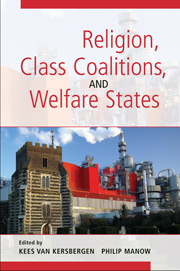Book contents
- Frontmatter
- Contents
- Preface
- List of Contributors
- 1 Religion and the Western Welfare State – The Theoretical Context
- 2 Western European Party Systems and the Religious Cleavage
- 3 The Religious Foundations of Work-Family Policies in Western Europe
- 4 Italy: A Christian Democratic or Clientelist Welfare State?
- 5 Religion and the Welfare State in the Netherlands
- 6 A Conservative Welfare State Regime without Christian Democracy? The French État-Providence, 1880–1960
- 7 Religion and the Consolidation of the Swiss Welfare State, 1848–1945
- 8 The Church as Nation? The Role of Religion in the Development of the Swedish Welfare State
- 9 The Religious Factor in U.S. Welfare State Politics
- 10 Religious Doctrines and Poor Relief: A Different Causal Pathway
- Index
1 - Religion and the Western Welfare State – The Theoretical Context
Published online by Cambridge University Press: 28 January 2010
- Frontmatter
- Contents
- Preface
- List of Contributors
- 1 Religion and the Western Welfare State – The Theoretical Context
- 2 Western European Party Systems and the Religious Cleavage
- 3 The Religious Foundations of Work-Family Policies in Western Europe
- 4 Italy: A Christian Democratic or Clientelist Welfare State?
- 5 Religion and the Welfare State in the Netherlands
- 6 A Conservative Welfare State Regime without Christian Democracy? The French État-Providence, 1880–1960
- 7 Religion and the Consolidation of the Swiss Welfare State, 1848–1945
- 8 The Church as Nation? The Role of Religion in the Development of the Swedish Welfare State
- 9 The Religious Factor in U.S. Welfare State Politics
- 10 Religious Doctrines and Poor Relief: A Different Causal Pathway
- Index
Summary
INTRODUCTION
Most comparativists who study welfare state development agree that religion has played a role in the development of modern social protection systems. The early protagonists of the power resources approach, however, had only stressed the causal impact of Socialist working-class mobilization on modern social policy (see Esping-Andersen and van Kersbergen 1992). In their view, it was the working class and its Socialist organizations that had been the driving force behind the ‘social democratization’ of capitalism via the welfare state. To them, it came as a surprise that both Social Democracy and (social) Catholicism promoted welfare state development. John D. Stephens (1979: 100), one of the leading spokesmen of this approach, put it in prudent terms when he argued that ‘it seemed possible that anti-capitalist aspects of catholic ideology – such as notions of fair wage or prohibitions of usury – as well as the generally positive attitude of the catholic church towards welfare for the poor might encourage government welfare spending.’ Similarly, Schmidt (1980, 1982) asserted that Social Democracy and Christian Democracy were functionally equivalent for welfare state expansion, at least during periods of economic prosperity. Wilensky (1981) argued that the two movements overlapped considerably in ideological terms and that Catholicism indeed constituted an even more important determinant of welfare statism than left power did. Catholic social doctrine called for a correction of the most abhorrent societal effects of the capitalist order. The Catholic principle of subsidiarity, moreover, posited that in the last instance the (nation-) state had a duty to intervene to correct for morally unacceptable market outcomes.
- Type
- Chapter
- Information
- Religion, Class Coalitions, and Welfare States , pp. 1 - 38Publisher: Cambridge University PressPrint publication year: 2009
- 37
- Cited by



